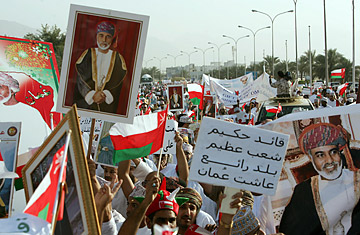
Supporters of Omani Sultan Qaboos demonstrate on March 1, 2011 in Muscat
Less than a week ago, Oman's industrial port city of Sohar, 230 kilometers northwest of the capital Muscat, was a very different place. Riot police were firing tear gas and rubber bullets at stone-throwing youths gathered at the Globe Roundabout, killing at least one and according to some media reports, as many as six civilians. The anti-government protesters then reportedly torched a nearby police station, as well as the Lulu supermarket across the road from the roundabout, a site that has become Oman's version of Egypt's iconic Tahrir Square.
But on Friday, there was a festive, almost picnic-like atmosphere as some 2,000 men gathered to attend Friday prayers on the landscaped grounds of the vast roundabout, laying out their prayer mats near trimmed hedges and bursts of lilac and white flowerbeds. This is revolution lite, Omani style. The people here don't want to bring down the regime, they want to reform it.
Huge posters of Oman's longtime ruler, Sultan Qaboos bin Said al-Said, hang from the roundabout, a tower whose four sides portray colorful tiled mosaics of horsemen among other things. "Qaboos you are pride of Oman and for you the love and loyalty" reads one in English. The protesters are at pains to stress that their action is not directed against their absolute monarch, a 70-year-old who is also the prime minister, foreign, defense and finance minister, as well as governor of the central bank.
On Friday the imam's sermon, a fiery diatribe against corruption, bribery and allegedly dirty politicians, was the most heated thing about the day, discounting the warm sunshine. "The ministers love the money," the cleric said, "we are in an age where justice is trampled on." He continued as several Omani military armored personnel carriers passed alongside the roundabout and a helicopter hovered overhead, making consecutively smaller circles around the site, and almost drowning out the preacher. "How can these officials steal from the country and kill their sons and then say 'we are innocent?' No! We will stand here until the corrupt are tried and our demands are met! God is with the oppressed until the oppressed achieve their rights and He is with us!"
It's a strong sermon, almost too strong for what is a relatively tame protest movement compared to other Middle Eastern uprisings. The end of the address is met with polite applause by the worshippers seated on the trimmed grass. There are no angry chants or even the customary cries of Allahu Akbar, as the men listen to several other speeches before breaking off into groups of four or five for a catered lunch of rice with chicken or meat.
Still, despite the low-key, placid nature of it all (except for that brief spasm of violence), the protesters have serious concerns about the future of this resource-rich country, which this year expects to raise its crude oil production to 900,000 barrels per day. It also has significant deposits of copper, gold, silica and other minerals. "We have three main demands," says Jamal Abdullah, 20, a university student. "The removal of all of the ministers, the creation of a free parliament chosen by the people and increased living standards including a real plan to tackle unemployment."
On Saturday, the Sultan, apparently in response to the small but persistent demonstrations around the country, replaced two high-ranking ministers. Last month, in a bid to assuage the protesters anger, he promised 50,000 new public sector jobs. But it's the type of jobs that he reportedly pledged that has left these protesters, most of whom are young men under 40, dissatisfied. "We are a petro-nation, we want jobs in administration, in the military, not grave digging or sheep shearing," Abdullah says, claiming that the last two occupations were on a government-issued list of newly created positions. Later in the day, the inspector-general of the police, a man the protesters want ousted for reportedly ordering the attacks on Sohar youths on Feb. 27, pledged that 10,000 new police officers would be recruited.
The local Omani media has given scant, if any, coverage to the young men. If anything, the demonstrators say it has misrepresented their cause by suggesting that they are against the sultan, prompting several pro-loyalty demonstrations in Muscat and elsewhere. The unrest has also taken on a sectarian tone. There are claims that Sohar and its surroundings, which are largely Sunni, are rebelling against the Sultan, who like the majority of Omanis belongs to the Ibadi sect, due to religious reasons. "They are trying to create divisions among us and say that the people of Sohar want a Sunni government," says Fadel al-Badi, a 26-year-old businessman. "But it won't work."
The young men say they don't want to leave the roundabout, and want their protest to remain a sit-in so that in the words of one, "we don't give them any excuse to say we're troublemakers." For his part, Ahmad al-Shizawe, a 36-year-old political activist who addressed the crowd following prayers, said Omanis must now know what they want and figure out how to get it. "We need to know what parliament means, what a constitution is," he said to applause. "We don't need martyrs, we need scholars."
